Are you aware that manual construction accounting can lead to significant errors and inefficiencies? As the value of Malaysia’s construction work increased by more than ten billion Malaysian ringgit in 2023, the growing complexity and scale of projects have made accurate financial management more challenging.
Construction accounting software is designed to address these issues by automating complex financial tasks, ensuring accuracy, and improving overall project management, thereby helping businesses manage their expanding operations more effectively.
Given these challenges, it’s clear that implementing construction accounting software is essential for preventing costly mistakes and streamlining operations. But with so many options available, how can businesses in Malaysia choose the right software to meet their specific needs?
This article aims to provide valuable insights and considerations to help you select the best construction accounting software for your business, ensuring you make an informed decision that supports your growth and success.
Key Takeaways
|
Table of Content
Content Lists

What is Construction Accounting Software?
Construction accounting software is a specialized tool designed to meet the unique financial management needs of the construction industry. Unlike generic accounting software, it caters specifically to the complexities of construction project accounting, offering features that address the particular challenges faced by construction companies.
One of the primary advantages of construction accounting software is its ability to streamline financial processes tailored for construction company accounting. This software supports detailed job costing, which helps construction accountants accurately track each project’s expenses and revenues.
Another key feature of construction accounting software is integrating various accounting modules. From accounts payable and receivable to payroll and general ledger management, it consolidates all financial activities into a single platform.
Why Should Malaysian Companies Use Construction Accounting Software?

Adopting construction accounting software can provide significant advantages for modern construction businesses in Malaysia. This software enhances operational efficiency and ensures businesses remain competitive in the industry by streamlining the management of fixed and variable costs.
- Flexibility and Accessibility: Cloud solutions allow construction companies to access financial data from anywhere at any time, promoting better collaboration and decision-making. This is particularly useful for Malaysian construction projects often involving remote sites and multiple teams working across different locations.
- Enhanced Data Security: Cloud-based systems provide secure, easily retrievable data storage, crucial in Malaysia with rising cybersecurity concerns. On-premise systems offer direct control over security measures, tailored to specific regulatory needs.
- Cost-Effectiveness: Cloud solutions reduce the need for expensive hardware and IT maintenance, with 73% of firms reporting better financial control and fewer payment delays.
- Improved Cash Flow Management: According to Deloitte, cloud solutions offer real-time financial visibility, improving cash flow management by 20%. On-premise solutions also provide robust cash flow tools, ensuring accurate and up-to-date financial data for informed decision-making.
- Robust Reporting and Analytics: These tools enable construction accountants to generate detailed financial reports, track project progress, and identify potential issues before they escalate.
21 Best Construction Accounting Software for Malaysian Businesses
Choosing the right construction accounting software for your business in Malaysia can be overwhelming with so many options available. To help, we’ve curated a list of the top accounting software tailored for the Malaysian market. Here are our top 21 best accounting software, highlighting their key features, strengths, and weaknesses:
1. HashMicro
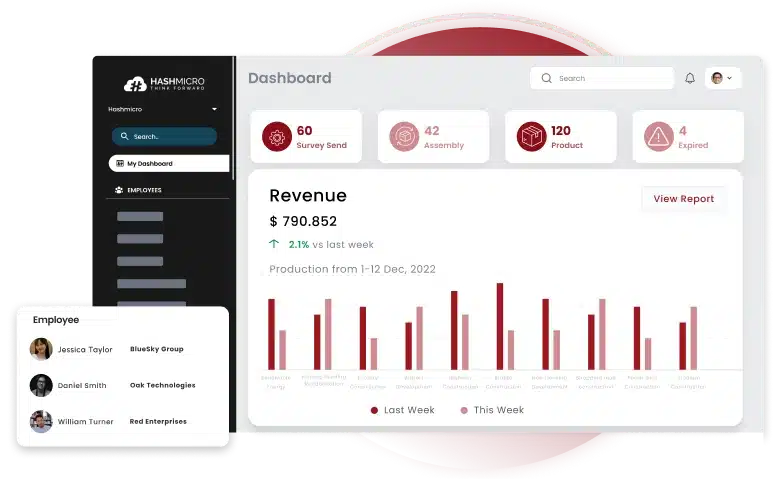
Best for: HashMicro is the perfect solution for cloud-based construction accounting software in Malaysia. It offers tailored features that streamline financial operations, ensure compliance, and boost overall efficiency.
Don’t just take our word for it—try the free demo today and see how HashMicro can transform your business!
HashMicro Construction Accounting Software is a powerful tool specifically designed to address the unique accounting challenges faced by construction businesses in Malaysia. It offers a comprehensive suite of features that can be tailored to meet each business’s specific needs.
Numerous construction companies across Southeast Asia trust HashMicro for its ability to streamline financial operations and enhance collaboration. With HashMicro, construction companies can efficiently manage their finances, ensuring accurate and up-to-date financial records.
The software provides real-time updates to make informed decisions based on the latest financial data. By integrating various modules, HashMicro helps construction businesses in Malaysia overcome common financial challenges, such as budget overruns, delayed payments, construction estimating, and complex tax compliance.
Key Features:
- Financial Dashboard: Provides a comprehensive financial health overview, including key metrics and performance indicators.
- Project Accounting: Allows for detailed tracking of project costs, budgets, and profitability.
- Cash Flow Forecasting: Helps predict future cash flow needs and manage liquidity effectively.
- Bank Reconciliation: Simplifies the process of matching bank statements with accounting records to ensure accuracy.
- Accrual and Amortization: Manages the recognition of revenue and expenses over time, ensuring compliance with accounting standards.
- Expense Management: Tracks and categorizes project-related expenses, ensuring accurate cost allocation and monitoring of project profitability
- Subcontractor Management: Manages contracts, payments, and performance tracking for subcontractors.
- Reporting and analytics: Provides comprehensive reporting that complies with Malaysian Financial Reporting Standards (MFRS), ensuring accurate and reliable financial insights for construction projects.
| Pros | Cons |
|
|
2. Premier
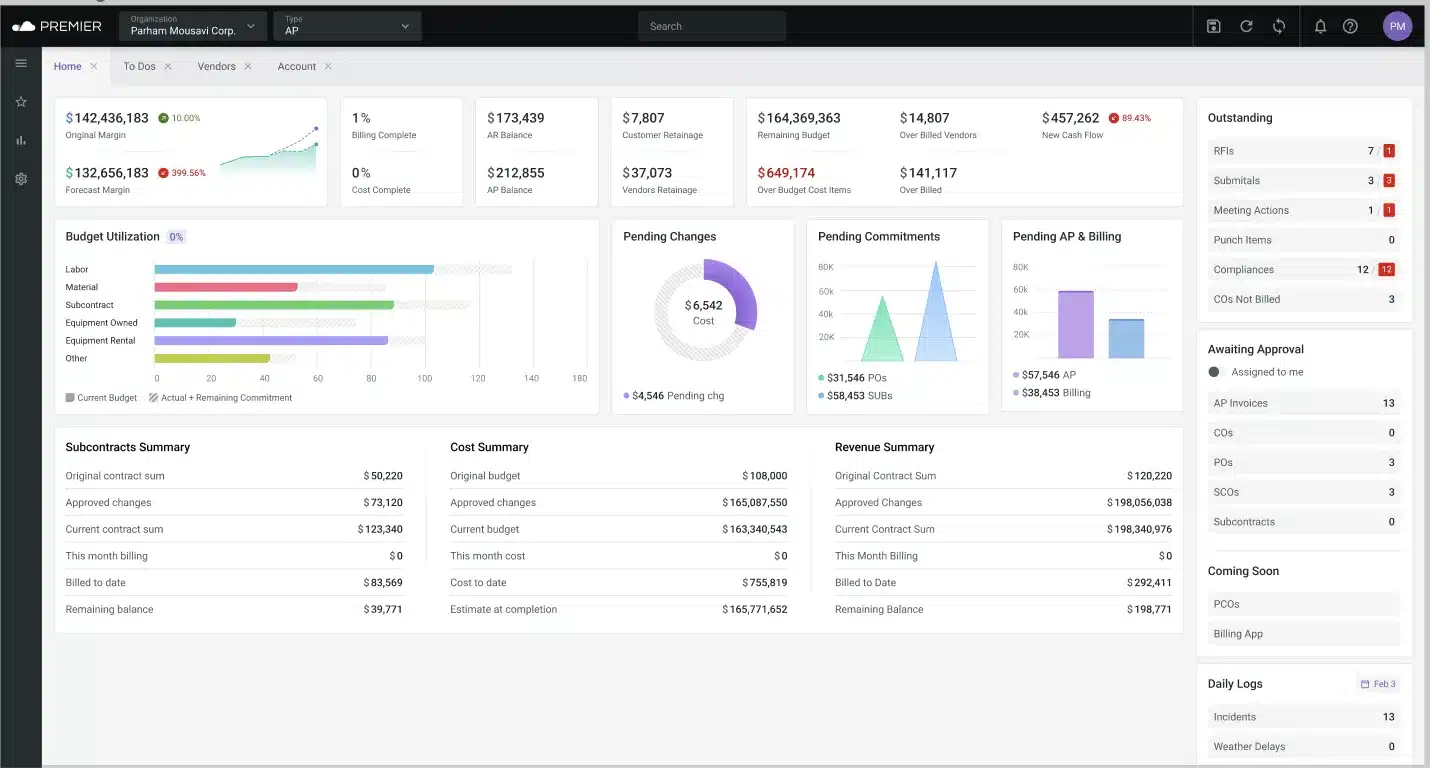
Premier offers a cloud-based construction accounting software that enables the management of multiple companies and projects. It features real-time job costing, budget management, and customizable dashboards for project oversight.
Key functionalities include cost-plus and progress billing, numerous accounting modules, document management, and payroll features. However, it lacks a mobile version and does not offer a free trial.
Features:
- Cost-plus billing, progress-billing, and other accounts receivable modules
- 50 pre-built customizable reports with drill-down capabilities
- Automated invoicing creation and alerts
- Cost-to-completion tracking and job costing
- Document management and electronic signatures
- Change order management
- Payroll, audit trails, and year-end financial reporting
| Pros | Cons |
|
|
Best for: General contractors, developers, homebuilders, and speciality contractors looking for an all-in-one solution.
3. CoConstruct
CoConstruct integrates project, operation, and financial management into a single platform, facilitating construction project management from preconstruction to financial oversight.
It features cost catalogs, lead management, standard estimating tools, and QuickBooks integration for financial tasks. Its project management capabilities are robust, though it lacks built-in payroll processing and advanced reporting features.
Features:
- Centralized project management platform
- Construction scheduling and timeline management
- Financial reporting and analytics
- Budgeting and forecasting tools
- Accounts payable and accounts receivable management
| Pros | Cons |
|
|
Best for: Small to medium-sized construction companies needing robust project management and integration with QuickBooks.
4. Foundation
Designed specifically for the construction industry, FOUNDATION is cloud-based software that offers a variety of customizable accounting modules and is recognized for its strong mobile usage.
Its features include AIA billing, job costing, general ledger, payroll management, and a CPA Audit and Review dashboard. Notably, it has limited project management tools and no mobile app.
Features:
- Standard AIA billing software
- Progress-billing, cost-plus, time and materials, unit price, and other accounts receivable modules
- Accounts payable module with conditional defaults and automatic error-checking to ensure accuracy
- General ledger with comparative trial balances, bank reconciliation, automated recurring journal entries, and audit trail management
- Budgeting software, job cost tracking, cost management and reporting, and change order management
- Timecard entry, processing, and calculations, prevailing wage management, and payroll reporting
- CPA Audit and Review dashboard to organize and share key reports and journal entries with CPAs
| Pros | Cons |
|
|
Best for: Mid-sized construction firms needing detailed job costing and financial management.
5. Buildertrend
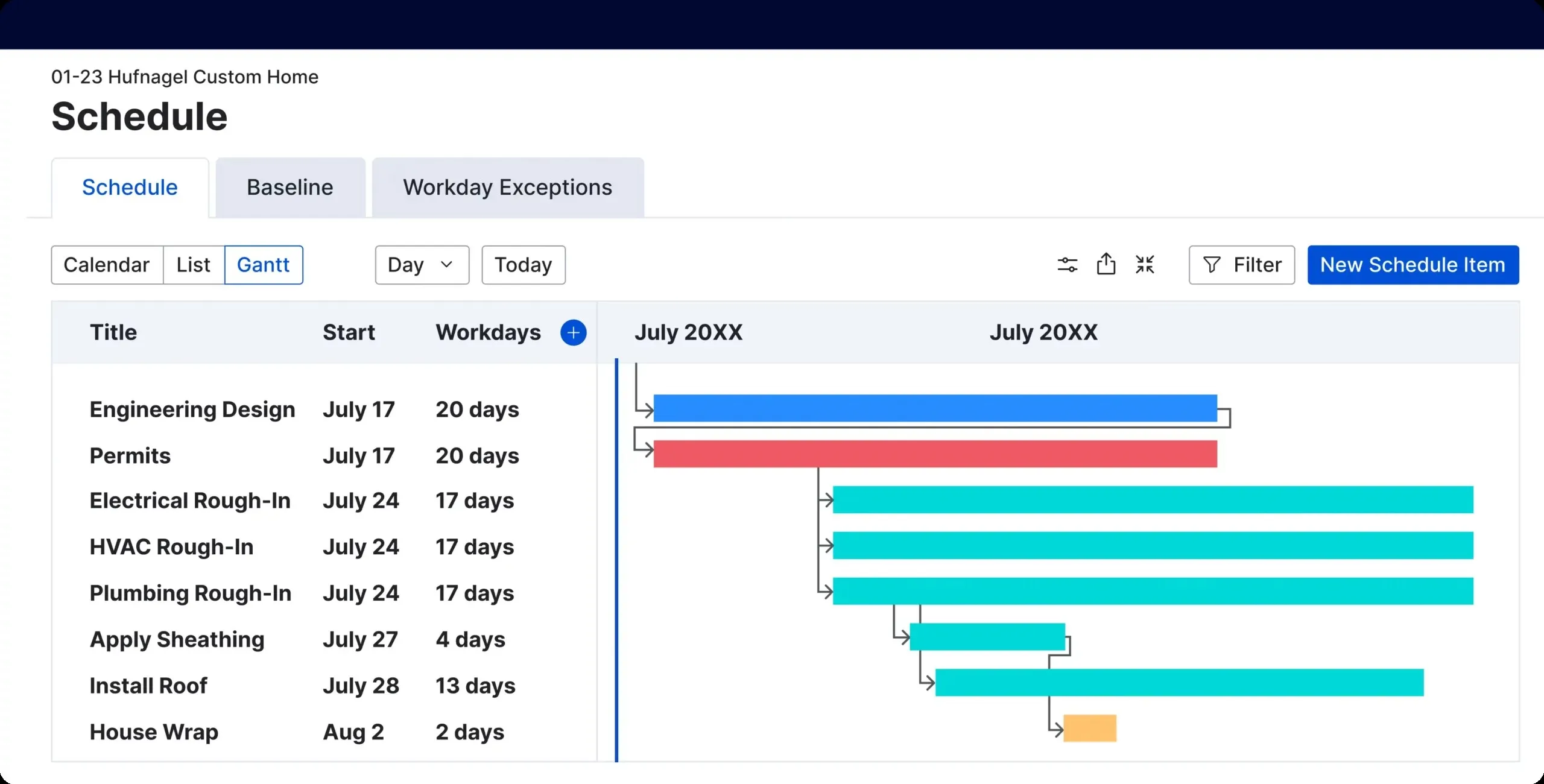
Buildertrend is a cloud-based construction management software ideal for homebuilders, custom builders, specialized contractors, and remodelers. This robust platform supports construction companies by reducing errors and accelerating project completion, ultimately enhancing client satisfaction.
Features:
- Tracks finances
- Facilitates and receives online payments
- Provides affordable insurance options
- Offers lending solutions
| Pros | Cons |
|
|
Best for: Residential construction companies and remodelers looking for comprehensive project management.
6. CMiC
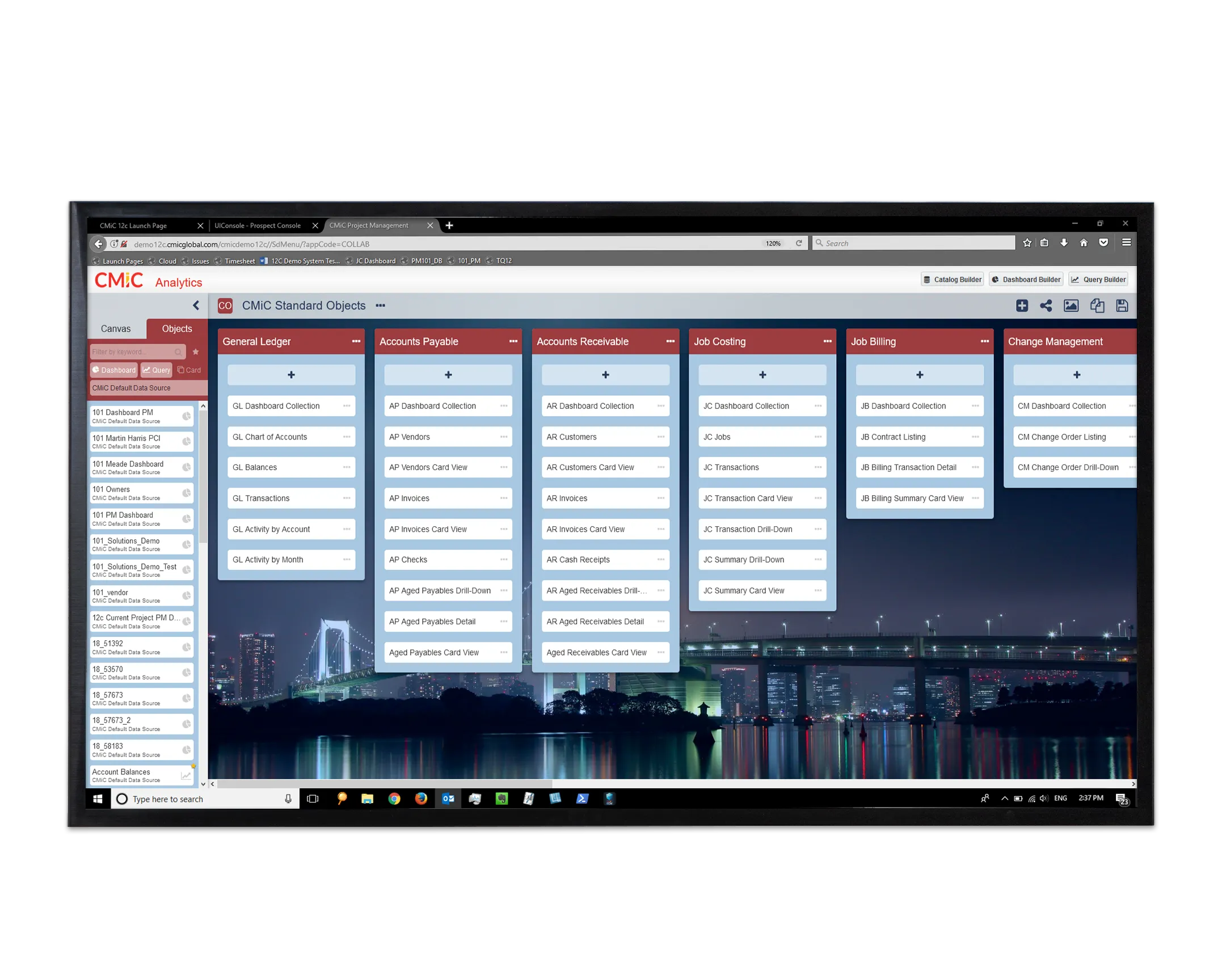
CMiC is a versatile accounting system suitable for various industries, including construction. This construction accounting software streamlines projects across financial management, cost management, revenue management, and financial reporting.
Features:
- Accounts payable, receivable, billing, and general ledger
- Revenue management with contract management and invoicing
- Cost management for labor, equipment, and expenses
- Comprehensive financial reporting
| Pros | Cons |
|
|
Best for: Large construction firms needing a comprehensive ERP solution.
7. NetSuite
NetSuite Cloud Accounting Software simplifies transaction recording, payables and receivables management, tax collection, and financial reporting. This cloud-based construction accounting software provides real-time financial data access and integrates seamlessly with other NetSuite platforms.
Features:
- Real-time financial insights
- Automated journal entries
- Enhanced audit trails
- Streamlined invoicing and accounts payable
| Pros | Cons |
|
|
Best for: Large enterprises needing extensive customization and financial management.
8. Century Software
Century Software Malaysia offers comprehensive construction accounting software tailored to the construction industry’s financial management needs. This software enhances financial accuracy and provides real-time insights into project costs and financial health.
Features:
- Project costing and management
- Financial reporting and analysis
- Budgeting and forecasting
- Accounts payable and receivable
- Cash flow management
- Payroll management
- Compliance and audit trail
| Pros | Cons |
|
|
Best for: Malaysian construction firms looking for a cost-effective solution.
9. Zoho Books
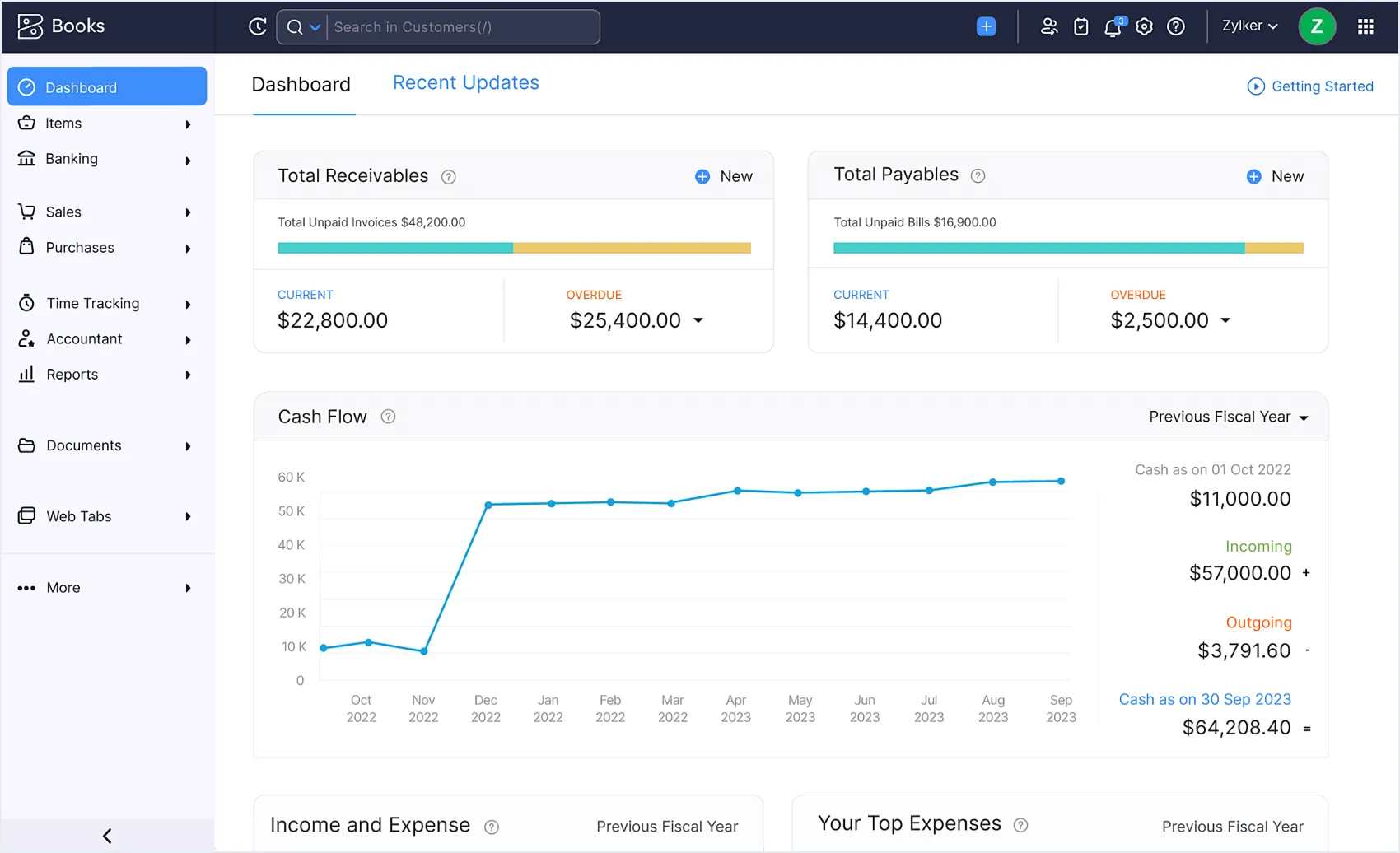
Zoho Books is an intelligent, cloud-based accounting system ideal for growing firms. It offers a streamlined process for sending invoices, tracking expenses, and managing financial statements, making it a strong contender for the best accounting software for construction companies.
Features:
- Customized and automated business workflows
- Comprehensive end-to-end accounting features
- Simple creation of bills and invoices
- Bills and invoices can be set on a loop
- Tracks landed costs and inventory level
| Pros | Cons |
|
|
Best for: Small construction businesses needing basic accounting.
10. Procore

Procore is cloud-based construction project management software tailored to each construction company’s specific needs. It features extensive customizations, collaboration tools, and analytics, making it ideal for large firms.
Features:
- Invoice creation, collection, and approval
- Automated billing workflows
- Comprehensive estimating and cost forecasting
- Custom workflows and collaboration
| Pros | Cons |
|
|
Best for: Large construction firms needing robust project management.
11. RedTeam
RedTeam, developed by a commercial construction firm, provides construction companies with a deep understanding of industry needs. It excels in bid management, project management, and communication, offering a well-rounded solution for construction project accounting.
Features:
- Comprehensive project management
- Bid management and comparison
- Change order management
- Vendor collaboration
| Pros | Cons |
|
|
Best for: Mid-sized to large construction firms needing comprehensive project management.
12. QuickBooks 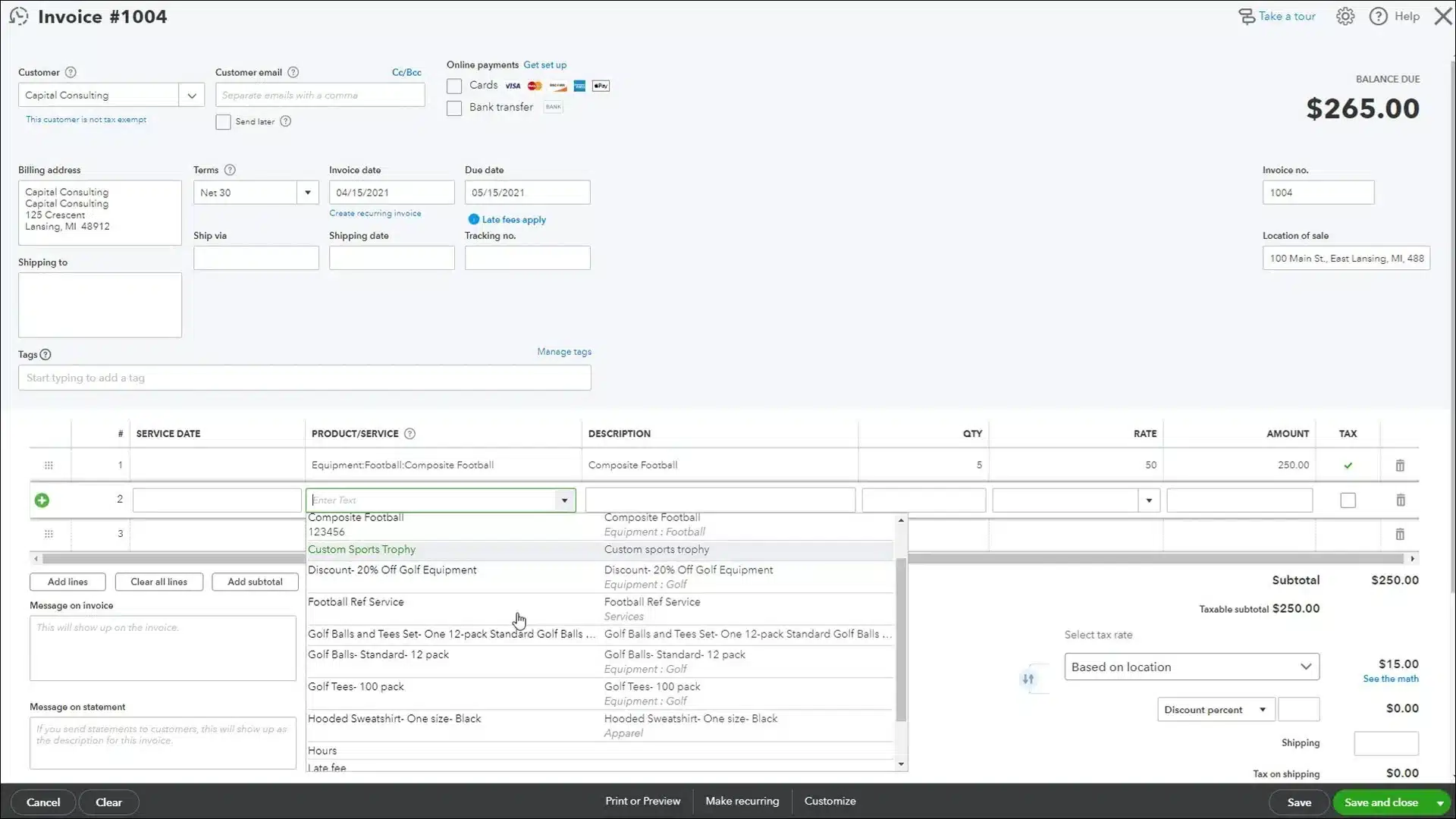
QuickBooks Enterprise Contractor Edition is an on-premise accounting software with optional cloud access. Favored by small to mid-sized construction firms, it offers powerful accounting and payroll capabilities, making it one of the best construction accounting software options.
Features:
- Accounts payable and receivable
- Invoicing, job costing, and estimates
- Payment processing
- Construction-specific reporting
| Pros | Cons |
|
|
Best for: Small to mid-sized construction firms needing basic accounting.
13. FreshBooks
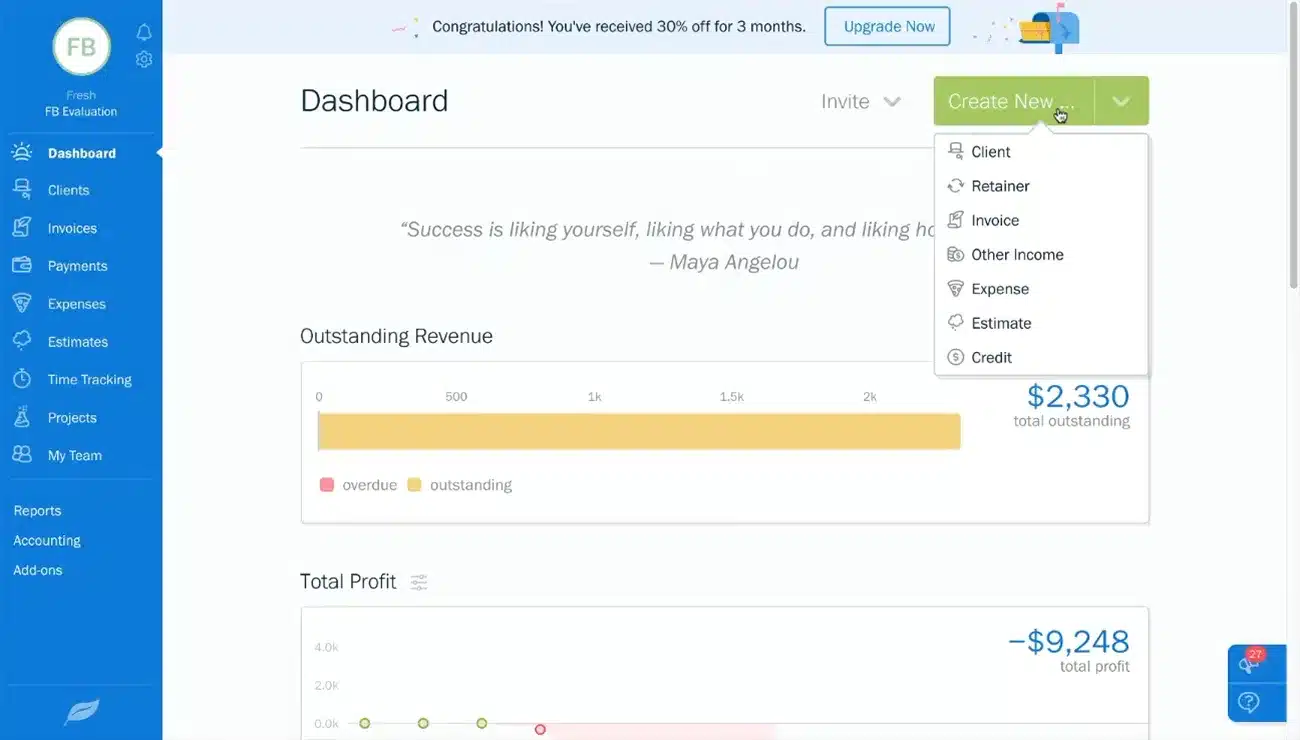
FreshBooks is a flexible, cloud-based accounting software designed for ease of use, making it suitable for construction companies. It simplifies expense tracking, invoicing, and financial reporting, ensuring smooth project management and financial oversight.
Features:
- Customizable Chart of Accounts
- Detailed financial insights
- Secure, cloud-based collaboration
| Pros | Cons |
|
|
Best for: Smaller construction companies that want user-friendly and good invoicing features.
14. Sage 300 Construction and Real Estate
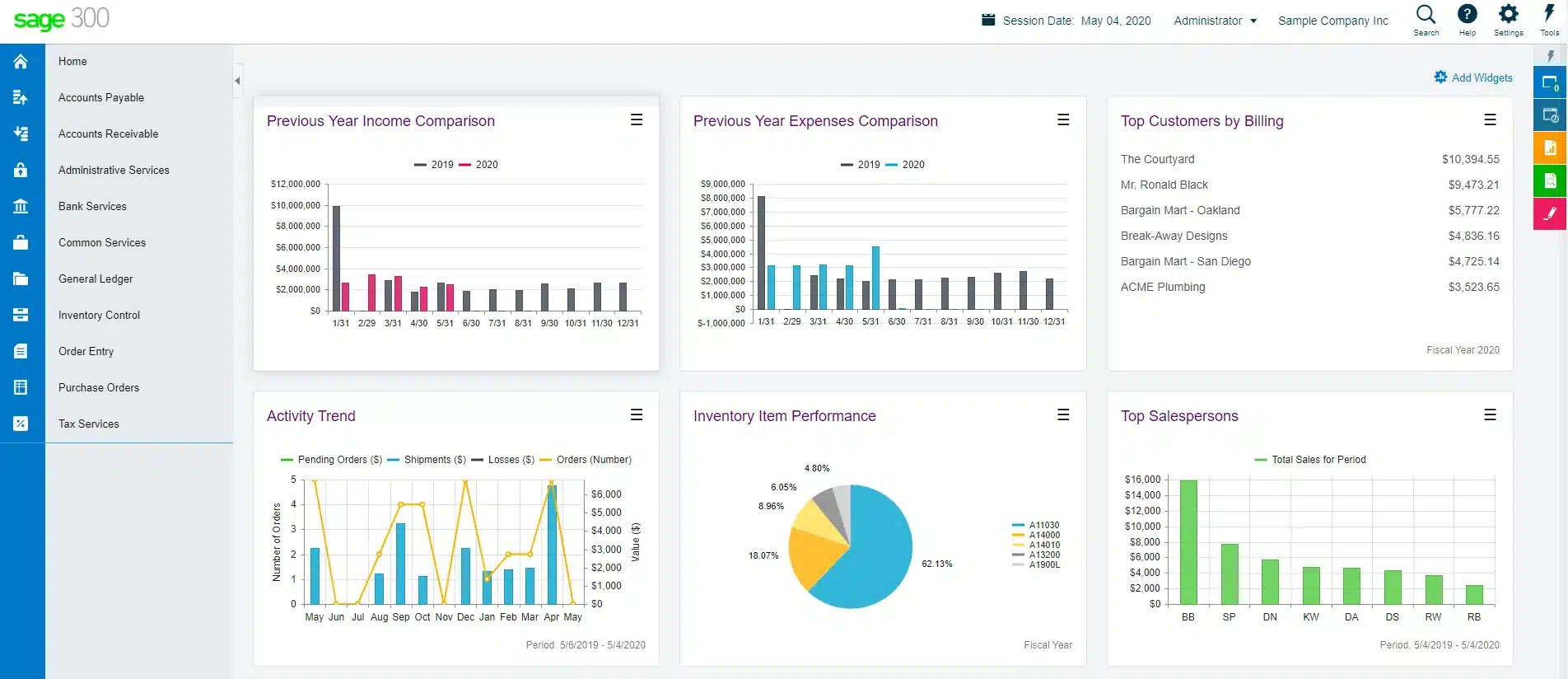
Sage 300 Construction and Real Estate (CRE) is a comprehensive construction and property management software ideal for mid-market to enterprise construction companies. Despite reduced new developments, it remains a strong choice for detailed financial management and construction project accounting.
Features:
- Document and project management
- Service management
- Complex inter-company billing
- Customized reporting
| Pros | Cons |
|
|
Best for: Mid to large-sized construction firms needing detailed financial management.
15. Deltek ComputerEase
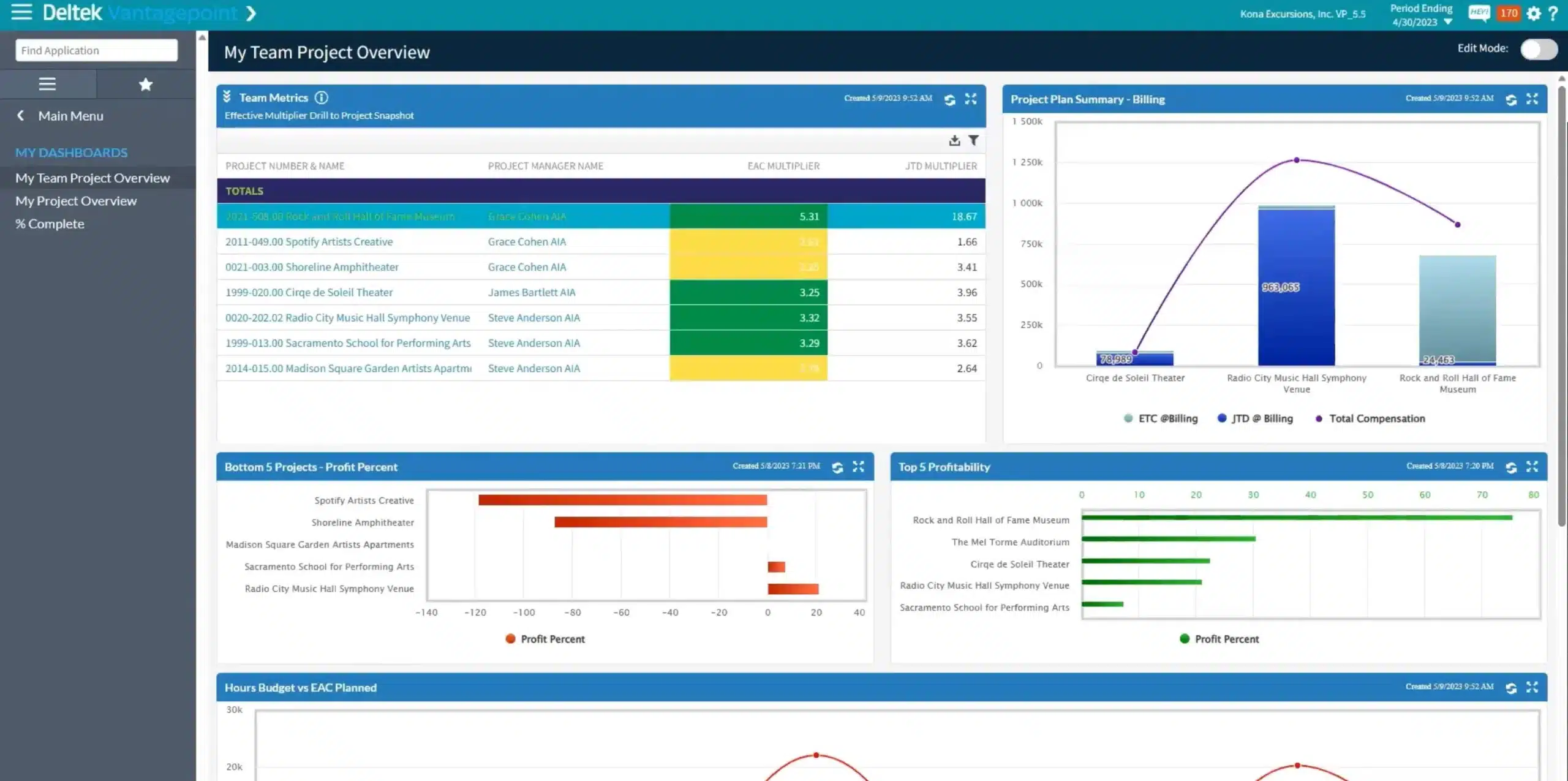
Deltek ComputerEase is designed specifically for construction accounting, offering flexible billing options and comprehensive job costing. This cloud-based software helps construction companies track project costs, manage payroll, and generate custom reports.
Features:
- Insurance, prevailing wage, and payroll management
- Flexible billing options
- Custom reports
- Pre-configured executive dashboards
- Cost tracking
| Pros | Cons |
|
|
Best for: Mid-sized construction firms needing robust job costing.
16. Xero
Xero is a versatile cloud-based accounting system suitable for construction companies. It automates invoicing, transaction recording, and integrates with bank accounts, making it a practical choice for accounting for construction companies.
Features:
- Bill and expense tracking
- Online payments integration
- Bank feed connection
- Time tracking
| Pros | Cons |
|
|
Best for: Small to mid-sized construction firms needing basic accounting
17. Gusto
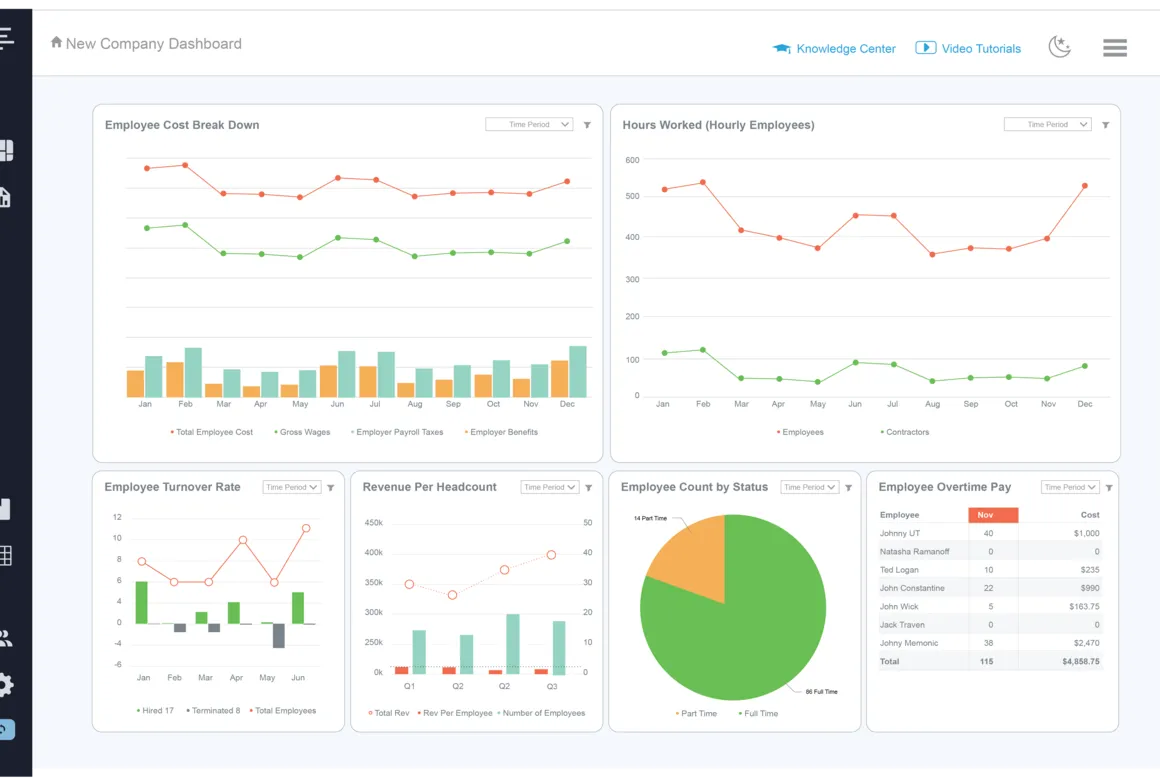
Gusto offers robust payroll and HR management for construction companies, supporting both local and international contractors. It excels in payroll processing and benefits management, although it lacks built-in accounting capabilities.
Features:
- Automatic tax calculation
- Unlimited payroll runs
- Time tracking integrated with payroll
- Supports international contractor payments
| Pros | Cons |
|
|
Best for: Small to mid-sized construction firms needing strong payroll management.
18. Viewpoint Vista
Viewpoint Vista is a comprehensive construction accounting and ERP system ideal for mid-sized to large companies. This platform offers detailed financial and project management, making it a strong candidate for best construction accounting software.
Features:
- Accounts payable, receivable, and general ledger
- Detailed tracking of contracts, change orders, and materials
- Multi-company and inter-company capabilities
- Job costing and budgeting
| Pros | Cons |
|
|
Best for: Large construction firms needing robust project and financial management.
19. Acumatica
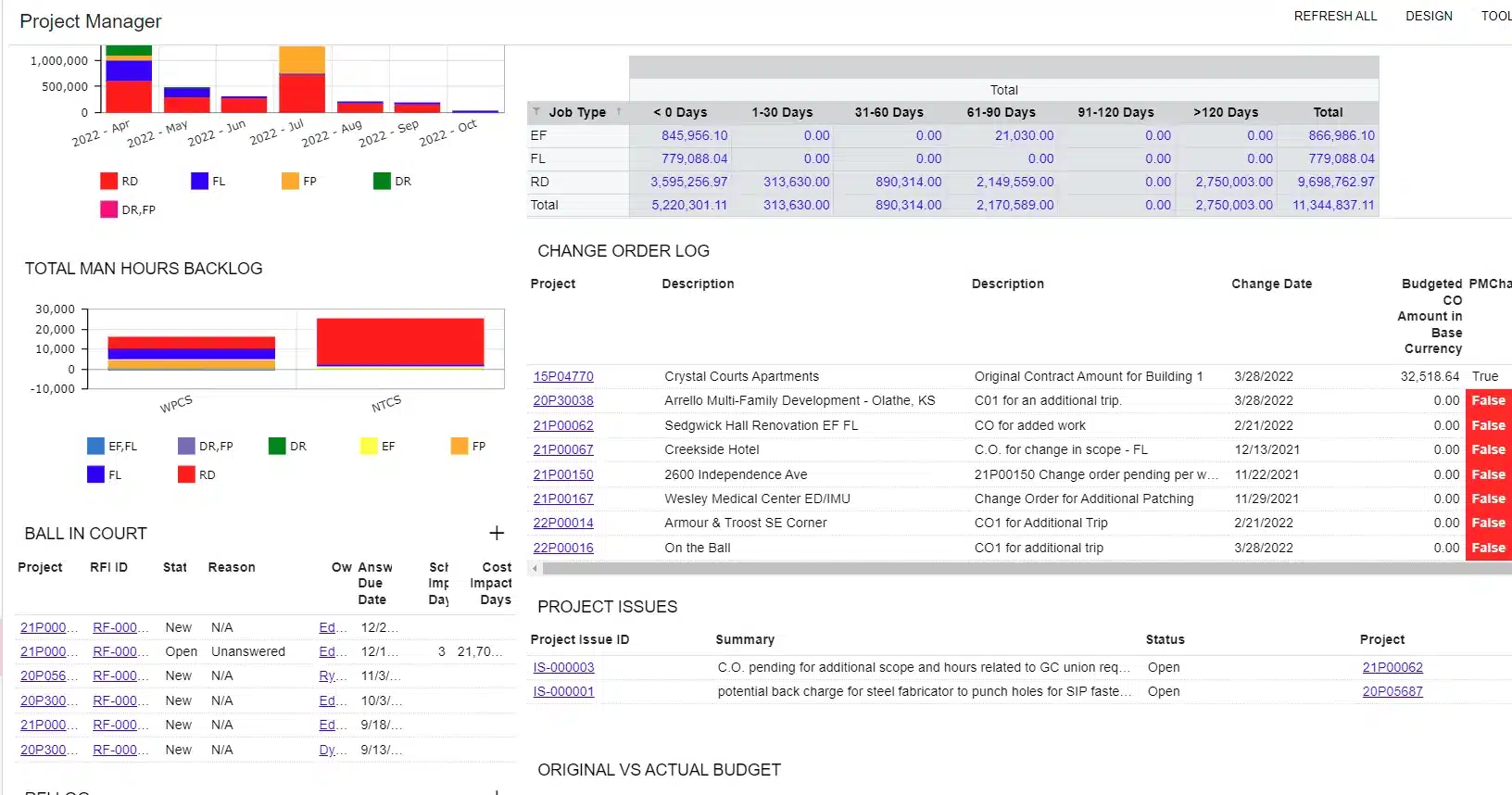
Acumatica is a cloud-based ERP software for construction companies, offering a balance of robust features and flexibility. It supports financial, project, and service management with an embedded CRM, making it a top choice for best accounting software for construction companies.
Features:
- General ledger, receivables, and payables
- Multi-company and inter-company accounting
- AIA reporting and payroll
- Cost tracking and business intelligence
| Pros | Cons |
|
|
Best for: Large enterprises needing extensive customization.
20. Construction Partner
Construction Partner is Windows-based, on-premise software that integrates accounting, estimating, and job costing for the construction industry. Its robust payroll and general ledger features make it particularly beneficial for mid-sized to large firms.
Features:
- Accounts payable and receivable
- Job costing, purchase orders, and estimating
- Payroll and labor compliance
- Equipment and inventory management
- Budgeting and forecasting
- Reporting and analytics
| Pros | Cons |
|
|
Best for: Mid-sized construction firms needing strong job costing.
21. COINS
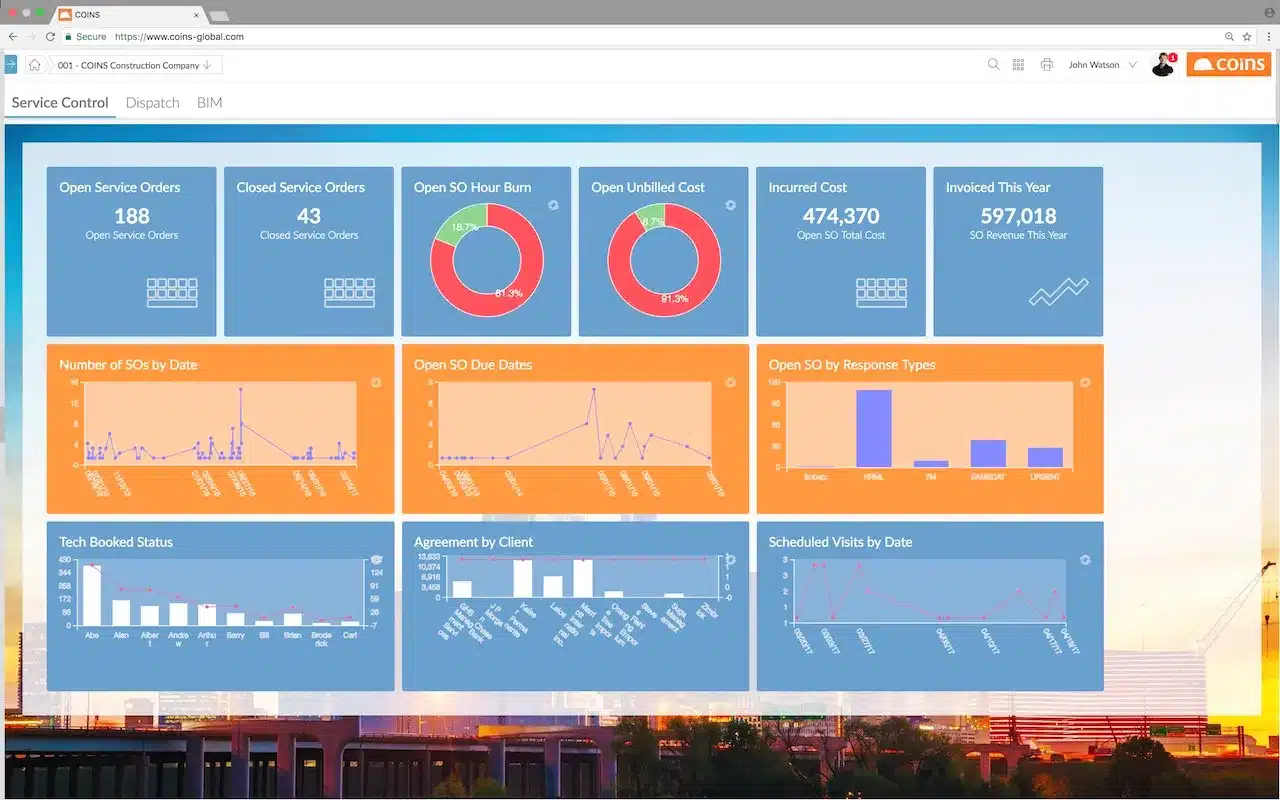
COINS, or Construction Industry Solutions, is comprehensive management software specifically tailored to the construction, engineering, home building, and service sectors.
Construction company accounting COINS covers a wide array of functions, including project delivery, supply chain oversight, and service management. Ideal for mid-sized to enterprise-level companies, COINS can be deployed either on-premise or as a cloud-based solution.
Features:
- Time and materials billing
- Pre-construction, project management, and post-construction tools and services
- Payroll management and time tracking
- Robust reporting with the ability to drill down into each transaction
- Financial forecasting tools
- Multi-currency handling
- Extensive information security controls
| Pros | Cons |
|
|
Best for: Large construction firms needing robust project and financial management.
Tips on Choosing the Right Construction Accounting Software

Selecting the right construction accounting software is crucial for the success of any construction business, including in Malaysia. Here are some key tips to help you make an informed decision:
- Understand your business needs: Identify the specific accounting challenges your business faces and the features you require, such as project cost tracking and progress billing.
- Integration capabilities: Ensure the software can integrate seamlessly with your existing systems, such as project management tools and ERP systems, to streamline operations.
- Compliance and reporting: Choose software that can handle local tax calculations and generate necessary reports to ensure compliance with Malaysian financial regulations.
- User-friendly interface: Opt for software with an intuitive design that simplifies complex accounting tasks and reduces the learning curve for your team.
- Localization: Ensure the software is tailored to the Malaysian market and complies with local regulations, standards, and languages. This includes considerations such as currency, tax calculations, and industry-specific requirements unique to Malaysia.
By considering these tips, you can select construction accounting software that not only meets your current needs but also supports your business growth and success in the competitive Malaysian market.
Conclusion
Selecting the right construction accounting software is crucial for the construction business in Malaysia. Effective software not only helps your accounting processes but also ensures accurate financial reporting, compliance with local regulations, and efficient budget management.
If you’re exploring construction accounting software options in Malaysia, consider HashMicro, a solution specifically designed for the local market. HashMicro integrates seamlessly with your existing workflows, simplifying complex accounting tasks and enhancing overall efficiency.
Experience the benefits of HashMicro, including advanced features, dedicated support, and scalability to support your business growth in the construction industry.
Interested in seeing how HashMicro can transform your business? Register for a free demo now and discover how it can simplify your project cost tracking and reporting!

FAQ about Construction Accounting in Malaysia
-
What type of accounting is used in construction?
In construction, project-based accounting is typically used. This method focuses on tracking each project’s costs, revenue, and profitability separately. It includes job costing, where expenses like labor, materials, and overhead are assigned to specific projects, allowing for accurate financial management.
-
How do you account for construction?
Construction accounting involves tracking and managing costs, revenues, and profits related to specific construction projects. The percentage-of-completion method or completed-contract method is often used, depending on the project’s duration. It ensures that construction costs are allocated correctly, and the revenue is recognized as work progresses.
-
How do you record construction accounting?
To record construction accounting, you’ll use specialized software or manual methods to document costs like labor, materials, and overhead for each project. These costs are then matched against revenue for accurate project financial reporting. Additionally, job costing ensures that each phase or segment of construction is properly tracked.
-
What is the formula for construction accounting?
In construction accounting, a basic formula for determining the project’s profit is: Profit = Revenue – Direct Costs (Labor + Materials + Overhead). A key metric often used is the Gross Profit Margin, which is calculated as: Gross Profit Margin = (Revenue – Cost of Goods Sold) / Revenue x 100. This helps you understand the profitability of each project and the efficiency of your cost management.































